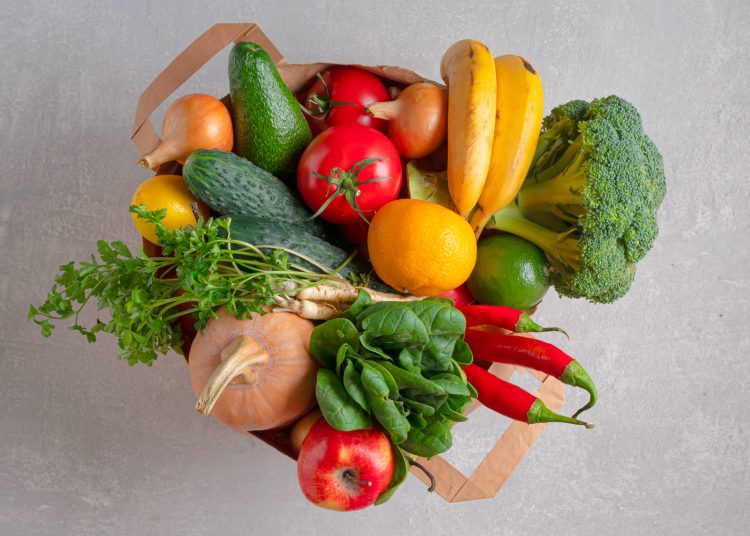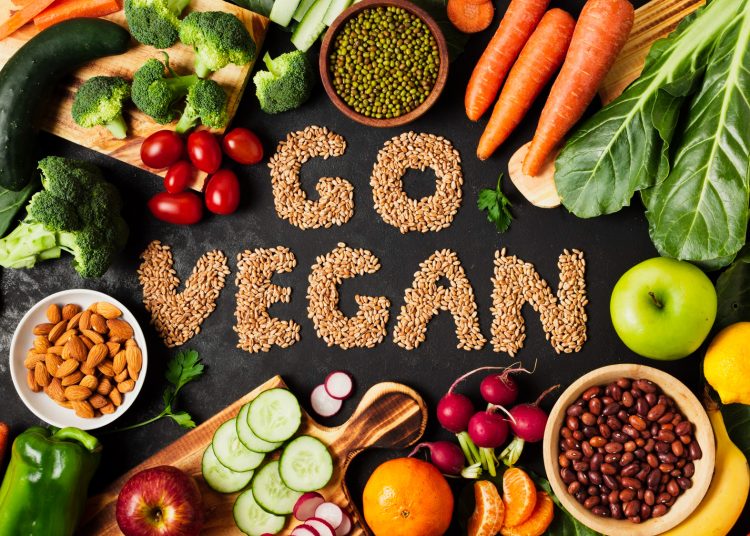Eco-friendly diets prioritize plant-based foods like fruits, vegetables, whole grains, and legumes while minimizing animal products. This reduces your carbon footprint and promotes a healthier, more sustainable lifestyle.
We are finally moving towards an era where most people know the importance of nutrition in their overall health and well-being. However, what benefits you might not always be good for the environment.
While eating animal foods like chicken (especially red meat like beef) can help you meet your daily protein requirements, they burn a hole in the environment.
Thankfully, we are seeing the introduction of new diets that are putting the environment first. These eating plans use alternate food sources to prevent nutritional deficiencies.
In this article, we discover how eco-friendly diets benefit your health and the environment. You’ll also learn about plant-based eating, sustainable food choices, and reducing your food-related carbon footprint.
Eco-Friendly Diets: Introduction
Let’s be honest. Have you ever considered the environmental impact of your diet?
I have no qualms in admitting that I had never paid attention to how my meals affected the environment until I watched the Netflix documentary The Game Changers (2018). I was so moved by this documentary that I turned vegan and stuck to the plant-based diet for 1.9 years.
Should everyone turn vegan? Well, that is a debate for another time.
But here is what I want you to know — it takes around 660 gallons of water to produce a single hamburger. Yes, you read that right. Six hundred sixty gallons of water for a single hamburger. How sick is that?
Here are some of the facts that you should know about a diet that is not designed keeping the environment in mind:
- Greenhouse Gases: According to some estimates, the current food production system roughly contributes to a third of worldwide greenhouse gas emissions. (1)
- Water Shortage: Agriculture is a water-intensive activity. It consumes around 70% of the planet’s freshwater supply (2). By how things are going, chances of this improving are bleak unless some substantial steps are taken.
- Deforestation: Farmlands around the world are being destroyed to expand agriculture, especially aminal husbandry. This can jeopardize biodiversity permanently.
These problems might sound too big for an individual to fix. However, the truth is an individual can reshape the planet’s future by fixing their dietary choices.
What are Eco-Friendly Diets?
Now that you understand what’s wrong with the current food system, it’s time to learn how eco-friendly diets can help.
Eco-friendly diets, also known as sustainable diets, are an incredibly potent tool for boosting individual health and protecting the planet’s resources. This diet doesn’t restrict you to particular foods or set a calorie limit but focuses on choosing eco-friendly, sustainable food sources.
Here is a low-down on what the eco-friendly diets focus on:
Switching to a Plant-Based Diet
This shouldn’t come as a surprise. Eco-friendly diets prioritize the consumption of fruits, veggies, whole grains, legumes, nuts, and seeds. More orthodox, eco-friendly diet plans involve purchasing organic foods from a local market.
So, while on an eco-friendly diet, you must mostly rely on nutrient-dense whole foods for your meals. Also, you must minimize the consumption of processed or refined foods.
Shunning Meat and Animal Products
Most people are confused about how cutting meat from their diet can help protect the environment.
The premise here is simple. Proponents of eco-friendly diets believe that if everyone gives up meat, milk, cheese, and yogurt, and the demand for animal products plummets, livestock farmers will shift to growing plant-based foods, which can lower greenhouse gases, water consumption, and deforestation and stop animal cruelty.
Being Mindful of Food Waste
Eco-friendly diets go beyond primarily eating plants. It also aims to cut back on food wastage. Sustainable diets promote purchasing, cooking, and eating just the right amount of food and eliminating wastage.
Eco-friendly diets don’t mean you have to go vegan tomorrow. Adopting a sustainable diet involves being more mindful of your dietary choices — and their impact on your body and the environment.
Several sustainable diets, like flexitarian, Mediterranean, and seasonal, can help you reduce animal food intake without the need to eliminate it.
Types of Eco-Friendly Diets
Convinced of the benefits and your responsibility to switch to a more eco-friendly diet?
Here are some of the most popular eco-friendly diets that you can choose from:
- Vegan: As you might have guessed, plant-based diets are the most eco-friendly and have the most negligible impact on climate and overall nature.
- Seasonal: It emphasized eating local in-season produce. This also reduced food transport emissions.
- Flexitarian: This diet mainly involves plant-based foods with occasional meat consumption.
- Mediterranean: It emphasizes plant-based foods and healthy fats. You can also consume seafood, poultry, eggs, dairy, and alcohol in this diet but in moderation.
Switching to an eco-friendly diet can be challenging for people who eat meat and eggs daily.
In this case, I highly recommend switching to a Mediterranean diet first. Going cold turkey on meat can lead to cravings and dissatisfaction. Transitioning to a vegan diet gradually is a more sustainable approach.
Start with the Mediterranean diet. Then, switch to the flexitarian diet before transitioning to the seasonal and vegan diets.
The Hidden Costs of Our Food (& How Eco-Friendly Diets Can Help)
Do you think that ‘clean’ and healthy foods like chicken and fish don’t harm the environment?
Each food we eat, packaged or directly from the farm, has an impact on the environment. Knowing how each food affects the environment can help you make informed choices.
Here are a few food sources and how they impact our planet:
Meat and Diary
Among all other foods, meat and dairy probably have the biggest impact on the environment.
Vast patches of land are cleared for livestock grazing. Plus, big farms are constructed to meet economies of scale. Animals also require giant amounts of water and food to thrive, which can result in a hefty environmental bill.
It doesn’t end here. Animals produce an enormous amount of greenhouse gases, which cause warming and affect various aspects of climate, including surface air and ocean temperatures, precipitation, and sea levels. (3)
Advocates of eco-friendly diets argue that livestock farming for meat and dairy is not sustainable as the world population grows. This is also the reason lab-grown meat is gaining popularity.
For the uninitiated, lab-grown meat has the same taste and nutritional profile as real meat. It is made by cultivating an animal’s stem cells in a lab.
Remember, although this food source is grown in labs, it is not vegan, as real animal cells are used in its making.
Seafood
Industrial-scale fishing often results in overfishing and is destroying entire marine habitats. Plus, fishing practices like bottom trawling destroy the delicate marine flora and fauna in the pursuit of catching our favorite seafood.
Processed Foods
Remember, no two foods are the same. Processed plant-based foods are not always eco-friendly.
Processed foods contain preservatives, which require huge amounts of renewable and non-renewable resources. Furthermore, their shiny packages and shipping them long distances can cause a giant dent in the environment.
How To Build Your Eco-Plate & Transition To an Eco-Friendly Diet
Here is how to build your eco-friendly diet:
Meatless Mondays
Contrary to what most people think, you don’t have to leap into an eco-friendly diet.
Start small. Swap out one animal-based meal per week with a plant-based alternative. As you get more comfortable, transition to two vegan meals weekly, and so on.
Switching meals gradually allows you to experiment with different recipes and meals. The rising popularity of vegan diets has given rise to countless plant-based cookbooks and cooking resources, which can be excellent resources for beginners.
Pick recipes that suit your taste buds. This will increase your odds of sticking to the plant-based diet over the long term.
Seafood
Folks who are fans of seafood must pick sustainably sourced, low-mercury options. Many organizations issue certifications to verify ethical farming practices.
Cut Out Processed Foods
Eliminating processed foods saves you from processed calories and limits packaging waste.
Some articles you find online will tell you only to cut out the ultra-processed foods. However, this can cause a lot of unnecessary confusion. Prevent this by cutting out all the processed foods from your diet. This might sound extreme, but it is absolutely doable.
Choose nutrient-whole foods as your primary sources of calories.
Meal Prep
I highly recommend prepping a week’s worth of meals on Sunday.
This significantly reduces the chances of feasting on junk food when you are busy and don’t have the time or energy to cook healthy food. The more convenient you make your meals, the higher your chances of sticking to your diet will be.
Meal prep also helps limit food wastage, which is another tenant of an eco-friendly diet. You must also learn to compost extra food. It can transform food waste into nutrient-rich soil for your garden or houseplants.
Benefits of Eco-Friendly Diets
Switching to an eco-friendly diet can be one of the best decisions you make.
Many stay away from eco-friendly diets because they subconsciously think that these diets are bland, boring, and not as nutrition-dense as animal food-based diets. However, they couldn’t be farther from the truth.
Here is how adopting an eco-friendly diet is good for you and the environment:
Improved Heart Health
Plant-based diets have been linked to lower risk of heart disease, type 2 diabetes, and certain cancers. All in all, eating an eco-friendly, sustainable diet can improve your longevity and overall functionality.
A meta-analysis published in the Nutrition Journal found that greater adherence to plant-based dietary patterns was consistently associated with lower risks of type 2 diabetes (T2D), cardiovascular disease (CVD), cancer, and all-cause mortality. (4)
Plant-based diets are also packed with antioxidants, which can significantly lower free radicals in your body. This can be an incredible boon for athletes, as it can speed up the recovery process after training. (5)
Weight Management
Whether your goal is to build muscle or ‘get fit,’ there is usually an accompanying weight target.
Most plant-based eco-friendly diets are high in fiber and low in calories. These diets keep you feeling full for longer, reducing the risk of snacking on unhealthy foods and promoting a healthy weight.
Nutrient-dense whole foods are also rich in vitamins and minerals, which can help your body defend against disease.
Saves the Environment
Most strength sports, and even all high-level professional sports, are very individualistic at their core.
You must focus on the minutest of details in your training and nutrition to maximize your performance. This usually leads us to adopt foods that will help us achieve our objective without considering their impact on the environment.
While these foods might help us attain our goals (which are mostly reversible), they lead to irreversible damage to the environment.
Livestock farming guzzles vast amounts of freshwater. Switching to a plant-based diet can drastically reduce our water footprint.
Replacing aminal foods with plant-based alternatives can also reduce greenhouse gas emissions, which can help cool the planet.
Eco-friendly diets can translate to cleaner air and water, thriving natural ecosystems, and a more stable climate.
FAQs
Are eco-friendly diets always plant-based?
No. You don’t have to eliminate meat from your diet to make it eco-friendly. Mediterranean and flexitarian diets allow meat consumption but are considered eco-friendly.
Does going vegetarian or vegan automatically make my diet eco-friendly?
No, this is not always true. Many people consume processed foods in their vegetarian or vegan diet, which can hamper the environment. You must consider the food sourcing, transport, and how much processing is involved to assess a diet’s environmental impact.
Conclusion
Make no mistake: changing how you eat is no easy task.
It might take you weeks, if not months, before you’ve fully adjusted to an eco-friendly diet. However, believe me (and the science behind it) that it will be the best decision you will make for your — and the environment’s — health.
Do you have any questions about eco-friendly diets or need help starting? Drop them in the comments below, and I’ll be happy to help!
References
Fitness Volt is committed to providing our readers with science-based information. We use only credible and peer-reviewed sources to support the information we share in our articles.
- Springmann, M., Clark, M., Mason-D’Croz, D., Wiebe, K., Bodirsky, B. L., Lassaletta, L., de Vries, W., Vermeulen, S. J., Herrero, M., Carlson, K. M., Jonell, M., Troell, M., DeClerck, F., Gordon, L. J., Zurayk, R., Scarborough, P., Rayner, M., Loken, B., Fanzo, J., Godfray, H. C. J., … Willett, W. (2018). Options for keeping the food system within environmental limits. Nature, 562(7728), 519–525. https://doi.org/10.1038/s41586-018-0594-0
- Ingrao, C., Strippoli, R., Lagioia, G., & Huisingh, D. (2023). Water scarcity in agriculture: An overview of causes, impacts and approaches for reducing the risks. Heliyon, 9(8), e18507. https://doi.org/10.1016/j.heliyon.2023.e18507
- Tan, X., Liu, Y., Dong, H., Xiao, Y., & Zhao, Z. (2022). The health consequences of greenhouse gas emissions: a potential pathway. Environmental geochemistry and health, 44(9), 2955–2974. https://doi.org/10.1007/s10653-021-01142-3
- Wang Y, Liu B, Han H, et al. Associations between plant-based dietary patterns and risks of type 2 diabetes, cardiovascular disease, cancer, and mortality – a systematic review and meta-analysis [published correction appears in Nutr J. 2024 Jan 4;23(1):6]. Nutr J. 2023;22(1):46. Published 2023 Oct 4. doi:10.1186/s12937-023-00877-2
- Kwaśniewska M, Pikala M, Grygorczuk O, et al. Dietary Antioxidants, Quality of Nutrition and Cardiovascular Characteristics among Omnivores, Flexitarians and Vegetarians in Poland-The Results of Multicenter National Representative Survey WOBASZ. Antioxidants (Basel). 2023;12(2):222. Published 2023 Jan 18. doi:10.3390/antiox12020222
Article Updates Timeline:
Our editorial team experts constantly update the articles with new information & research, ensuring you always have access to the latest and most reliable information.
February 27, 2024
Written By
Vidur Saini
Reviewed By
Editorial Team
Fact Checked By
Dr. Malik
Tip: If you're signed in to Google, tap Follow.












